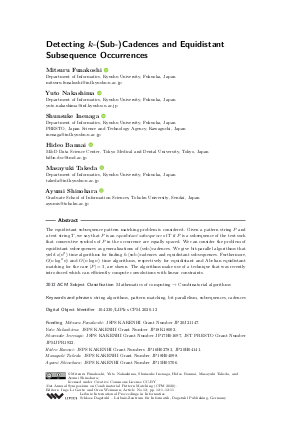Detecting k-(Sub-)Cadences and Equidistant Subsequence Occurrences
Authors
Mitsuru Funakoshi  ,
Yuto Nakashima
,
Yuto Nakashima  ,
Shunsuke Inenaga
,
Shunsuke Inenaga  ,
Hideo Bannai
,
Hideo Bannai  ,
Masayuki Takeda
,
Masayuki Takeda  ,
Ayumi Shinohara
,
Ayumi Shinohara 
-
Part of:
Volume:
31st Annual Symposium on Combinatorial Pattern Matching (CPM 2020)
Part of: Series: Leibniz International Proceedings in Informatics (LIPIcs)
Part of: Conference: Annual Symposium on Combinatorial Pattern Matching (CPM) - License:
 Creative Commons Attribution 3.0 Unported license
Creative Commons Attribution 3.0 Unported license
- Publication Date: 2020-06-09
File

PDF
LIPIcs.CPM.2020.12.pdf
- Filesize: 0.53 MB
- 11 pages
Document Identifiers
Subject Classification
ACM Subject Classification
- Mathematics of computing → Combinatorial algorithms
Keywords
- string algorithms
- pattern matching
- bit parallelism
- subsequences
- cadences
Metrics
- Access Statistics
-
Total Accesses (updated on a weekly basis)
0Document
0Metadata
Abstract
The equidistant subsequence pattern matching problem is considered. Given a pattern string P and a text string T, we say that P is an equidistant subsequence of T if P is a subsequence of the text such that consecutive symbols of P in the occurrence are equally spaced. We can consider the problem of equidistant subsequences as generalizations of (sub-)cadences. We give bit-parallel algorithms that yield o(n²) time algorithms for finding k-(sub-)cadences and equidistant subsequences. Furthermore, O(nlog² n) and O(nlog n) time algorithms, respectively for equidistant and Abelian equidistant matching for the case |P| = 3, are shown. The algorithms make use of a technique that was recently introduced which can efficiently compute convolutions with linear constraints.
Cite As Get BibTex
Mitsuru Funakoshi, Yuto Nakashima, Shunsuke Inenaga, Hideo Bannai, Masayuki Takeda, and Ayumi Shinohara. Detecting k-(Sub-)Cadences and Equidistant Subsequence Occurrences. In 31st Annual Symposium on Combinatorial Pattern Matching (CPM 2020). Leibniz International Proceedings in Informatics (LIPIcs), Volume 161, pp. 12:1-12:11, Schloss Dagstuhl – Leibniz-Zentrum für Informatik (2020)
https://doi.org/10.4230/LIPIcs.CPM.2020.12
BibTex
@InProceedings{funakoshi_et_al:LIPIcs.CPM.2020.12,
author = {Funakoshi, Mitsuru and Nakashima, Yuto and Inenaga, Shunsuke and Bannai, Hideo and Takeda, Masayuki and Shinohara, Ayumi},
title = {{Detecting k-(Sub-)Cadences and Equidistant Subsequence Occurrences}},
booktitle = {31st Annual Symposium on Combinatorial Pattern Matching (CPM 2020)},
pages = {12:1--12:11},
series = {Leibniz International Proceedings in Informatics (LIPIcs)},
ISBN = {978-3-95977-149-8},
ISSN = {1868-8969},
year = {2020},
volume = {161},
editor = {G{\o}rtz, Inge Li and Weimann, Oren},
publisher = {Schloss Dagstuhl -- Leibniz-Zentrum f{\"u}r Informatik},
address = {Dagstuhl, Germany},
URL = {https://drops.dagstuhl.de/entities/document/10.4230/LIPIcs.CPM.2020.12},
URN = {urn:nbn:de:0030-drops-121375},
doi = {10.4230/LIPIcs.CPM.2020.12},
annote = {Keywords: string algorithms, pattern matching, bit parallelism, subsequences, cadences}
}
Author Details
- Department of Informatics, Kyushu University, Fukuoka, Japan
- PRESTO, Japan Science and Technology Agency, Kawaguchi, Japan
Funding
- Funakoshi, Mitsuru: JSPS KAKENHI Grant Number JP20J21147.
- Nakashima, Yuto: JSPS KAKENHI Grant Number JP18K18002.
- Inenaga, Shunsuke: JSPS KAKENHI Grant Number JP17H01697, JST PRESTO Grant Number JPMJPR1922.
- Bannai, Hideo: JSPS KAKENHI Grant Numbers JP16H02783, JP20H04141.
- Takeda, Masayuki: JSPS KAKENHI Grant Number JP18H04098.
- Shinohara, Ayumi: JSPS KAKENHI Grant Number JP15H05706.
References
-
Amihood Amir, Alberto Apostolico, Travis Gagie, and Gad M. Landau. String cadences. Theoretical Computer Science, 698:4-8, 2017. Algorithms, Strings and Theoretical Approaches in the Big Data Era (In Honor of the 60th Birthday of Professor Raffaele Giancarlo).

-
Robert S. Boyer and J. Strother Moore. A fast string searching algorithm. Commun. ACM, 20(10):762–772, 1977.

-
Maxime Crochemore and Dominique Perrin. Two-way string-matching. J. ACM, 38(3):650–674, 1991.

-
Simone Faro, Thierry Lecroq, Stefano Borzi, Simone Di Mauro, and Alessandro Maggio. The string matching algorithms research tool. In Proceedings of the Prague Stringology Conference 2016, Prague, Czech Republic, August 29-31, 2016, pages 99-111. Department of Theoretical Computer Science, Faculty of Information Technology, Czech Technical University in Prague, 2016.

-
Mitsuru Funakoshi and Julian Pape-Lange. Non-rectangular convolutions and (sub-)cadences with three elements. In 37th International Symposium on Theoretical Aspects of Computer Science, STACS 2020, March 10-13, 2020, Montpellier, France, volume 154 of LIPIcs, pages 30:1-30:16. Schloss Dagstuhl - Leibniz-Zentrum für Informatik, 2020.

-
Zvi Galil and Joel Seiferas. Time-space-optimal string matching. Journal of Computer and System Sciences, 26(3):280-294, 1983.

-
J. Gardelle. Cadences. Mathématiques et Sciences humaines, 9:31-38, 1964.

-
R. Nigel Horspool. Practical fast searching in strings. Software: Practice and Experience, 10(6):501-506, 1980.

-
Donald E. Knuth, James H. Morris Jr., and Vaughan R. Pratt. Fast pattern matching in strings. SIAM J. Comput., 6(2):323-350, 1977.

-
M. Lothaire. Combinatorics on Words. Cambridge Mathematical Library. Cambridge University Press, 1997.

- Phillip Matier and Andrew Ross. Did Schwarzenegger drop 4-letter bomb in veto? San Francisco Chronicle, 2009. URL: http://www.sfgate.com/cgi-bin/article.cgi?f=/c/a/2009/10/28/MNBN1ABKB8.DTL.
-
Doron Witztum, Eliyahu Rips, and Yoav Rosenberg. Equidistant letter sequences in the book of genesis. Statistical Science, 9(3):429-438, 1994.

